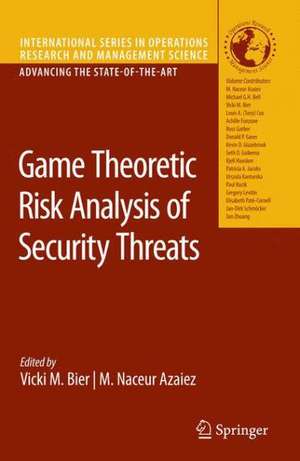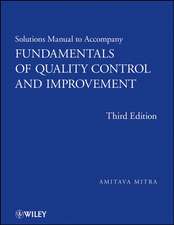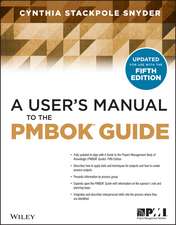Game Theoretic Risk Analysis of Security Threats: International Series in Operations Research & Management Science, cartea 128
Editat de Vicki M. Bier, M. Naceur Azaiezen Limba Engleză Paperback – 14 dec 2011
| Toate formatele și edițiile | Preț | Express |
|---|---|---|
| Paperback (1) | 694.87 lei 6-8 săpt. | |
| Springer Us – 14 dec 2011 | 694.87 lei 6-8 săpt. | |
| Hardback (1) | 778.47 lei 38-44 zile | |
| Springer Us – 4 dec 2008 | 778.47 lei 38-44 zile |
Din seria International Series in Operations Research & Management Science
- 20%
 Preț: 331.25 lei
Preț: 331.25 lei - 20%
 Preț: 570.61 lei
Preț: 570.61 lei - 18%
 Preț: 1132.02 lei
Preț: 1132.02 lei - 18%
 Preț: 773.72 lei
Preț: 773.72 lei -
 Preț: 170.39 lei
Preț: 170.39 lei - 17%
 Preț: 459.34 lei
Preț: 459.34 lei - 17%
 Preț: 360.47 lei
Preț: 360.47 lei -
 Preț: 263.40 lei
Preț: 263.40 lei - 24%
 Preț: 905.30 lei
Preț: 905.30 lei - 17%
 Preț: 460.08 lei
Preț: 460.08 lei - 17%
 Preț: 459.34 lei
Preț: 459.34 lei - 20%
 Preț: 631.58 lei
Preț: 631.58 lei - 13%
 Preț: 480.00 lei
Preț: 480.00 lei - 18%
 Preț: 738.28 lei
Preț: 738.28 lei - 18%
 Preț: 1225.94 lei
Preț: 1225.94 lei - 18%
 Preț: 948.92 lei
Preț: 948.92 lei - 18%
 Preț: 703.88 lei
Preț: 703.88 lei - 18%
 Preț: 957.44 lei
Preț: 957.44 lei - 15%
 Preț: 651.84 lei
Preț: 651.84 lei - 20%
 Preț: 336.21 lei
Preț: 336.21 lei - 15%
 Preț: 641.03 lei
Preț: 641.03 lei -
 Preț: 404.29 lei
Preț: 404.29 lei - 18%
 Preț: 950.21 lei
Preț: 950.21 lei - 15%
 Preț: 649.06 lei
Preț: 649.06 lei - 18%
 Preț: 725.75 lei
Preț: 725.75 lei -
 Preț: 394.12 lei
Preț: 394.12 lei - 18%
 Preț: 951.47 lei
Preț: 951.47 lei - 15%
 Preț: 639.59 lei
Preț: 639.59 lei - 18%
 Preț: 773.06 lei
Preț: 773.06 lei - 18%
 Preț: 889.29 lei
Preț: 889.29 lei - 15%
 Preț: 655.60 lei
Preț: 655.60 lei - 15%
 Preț: 640.06 lei
Preț: 640.06 lei - 15%
 Preț: 583.93 lei
Preț: 583.93 lei
Preț: 694.87 lei
Preț vechi: 817.50 lei
-15% Nou
Puncte Express: 1042
Preț estimativ în valută:
132.97€ • 139.11$ • 110.45£
132.97€ • 139.11$ • 110.45£
Carte tipărită la comandă
Livrare economică 02-16 aprilie
Preluare comenzi: 021 569.72.76
Specificații
ISBN-13: 9781441946881
ISBN-10: 1441946888
Pagini: 248
Ilustrații: VI, 242 p.
Dimensiuni: 155 x 235 x 13 mm
Greutate: 0.36 kg
Ediția:2009
Editura: Springer Us
Colecția Springer
Seria International Series in Operations Research & Management Science
Locul publicării:New York, NY, United States
ISBN-10: 1441946888
Pagini: 248
Ilustrații: VI, 242 p.
Dimensiuni: 155 x 235 x 13 mm
Greutate: 0.36 kg
Ediția:2009
Editura: Springer Us
Colecția Springer
Seria International Series in Operations Research & Management Science
Locul publicării:New York, NY, United States
Public țintă
ResearchCuprins
Why Both Game Theory and Reliability Theory Are Important in Defending Infrastructure against Intelligent Attacks.- Game Theory Models of Intelligent Actors in Reliability Analysis: An Overview of the State of the Art.- Optimizing Defense Strategies for Complex Multi-State Systems.- Defending Against Terrorism, Natural Disaster, and All Hazards.- A Bayesian Model for a Game of Information in Optimal Attack/Defense Strategies.- Search for a Malevolent Needle in a Benign Haystack.- Games and Risk Analysis: Three Examples of Single and Alternate Moves.- Making Telecommunications Networks Resilient against Terrorist Attacks.- Improving Reliability through Multi-Path Routing and Link Defence: An Application of Game Theory to Transport.
Recenzii
From the reviews:
“This book is a collection of several articles on the analysis of defending infrastructure against terrorism attacks by means of game theory and reliability theory. … well written and it can be useful for researchers in this field. It not only provides the state-of-the-art review of attack–defend models but also describes the algorithms in detail.” (J. Li, Journal of the Operational Research Society, Vol. 61 (12), 2010)
“This book is a collection of several articles on the analysis of defending infrastructure against terrorism attacks by means of game theory and reliability theory. … well written and it can be useful for researchers in this field. It not only provides the state-of-the-art review of attack–defend models but also describes the algorithms in detail.” (J. Li, Journal of the Operational Research Society, Vol. 61 (12), 2010)
Textul de pe ultima copertă
Game Theoretic Risk Analysis of Security Threats introduces reliability and risk analysis in the face of threats by intelligent agents. More specifically, game-theoretic models will be developed for identifying optimal and/or equilibrium defense and attack strategies in systems of varying degrees of complexity. The book covers applications to networks, including problems in both telecommunications and transportation. However, the book’s primary focus is to integrate game theory and reliability methodologies into unified techniques to predict, detect, diminish, and stop intentional attacks at targets that vary in complexity.
In this book, leading researchers combine reliability and risk analysis with game theory methods to create a set of functional tools that can be used by security personnel to offset intentional, intelligent threats (including the threats of terrorism and war). This means a comprehensive treatment of such problems must consider two aspects: (1) the structure of the system to be protected and (2) the adaptive nature of the threat (that is, beyond the static nature of the threat). The book provides a set of scientific tools for analyzing and applying game-theoretic reliability problems in the presence of intentional, intelligent threats. These scientific tools address problems of global safety and create more cost-effective defensive investments.
In this book, leading researchers combine reliability and risk analysis with game theory methods to create a set of functional tools that can be used by security personnel to offset intentional, intelligent threats (including the threats of terrorism and war). This means a comprehensive treatment of such problems must consider two aspects: (1) the structure of the system to be protected and (2) the adaptive nature of the threat (that is, beyond the static nature of the threat). The book provides a set of scientific tools for analyzing and applying game-theoretic reliability problems in the presence of intentional, intelligent threats. These scientific tools address problems of global safety and create more cost-effective defensive investments.
Caracteristici
The first book to apply game-theoretic models and reliability theory to defending infrastructure against intelligent attacks Demonstrates attack-defense models that avoid the mathematical quagmire of full game-theoretic modeling Applicable to all infrastructure arenas – networked infrastructures such as oil pipelines or electric grids; built infrastructures such as buildings and stadiums; information infrastructures such as flight control or civil defense; and production, processing and distribution supply chains







